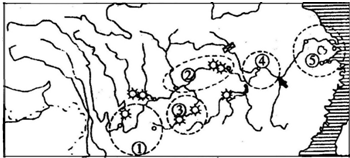问题
问答题
读“长江沿岸工业带图”,回答问题.
(1)①是以______和______为中心的钢铁、煤炭工业基地,⑤为我国最大的______工业基地,该工业基地突出的问题是缺乏______.
(2)④是以______为中心的钢铁工业基地,②工业基地有正在建设中的我国最大水电站______水电站.

答案
(1)①是以重庆和攀枝花为中心的钢铁、煤炭工业基地,⑤为我国最大的沪宁杭工业基地,该工业基地突出的问题是缺乏煤铁等矿产资源;
(2)④是以武汉为中心的钢铁工业基地,②工业基地有正在建设中的我国最大水电站三峡水电站.
故答案为:
(1)重庆;攀枝花;沪宁杭;缺乏煤铁等矿产资源;
(2)武汉;三峡
